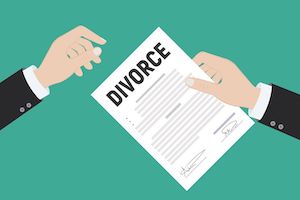
Why Did I Get Married? Annulment Basics in North Carolina
 Annulment is the legal procedure that declares a marriage void from its inception. The marriage is deemed as illegal when it was pronounced, therefore, the effect of an annulment is retroactive invalidity. Annulment is granted on varying grounds depending on the state at issue including insanity, bigamy and incest.
Annulment is the legal procedure that declares a marriage void from its inception. The marriage is deemed as illegal when it was pronounced, therefore, the effect of an annulment is retroactive invalidity. Annulment is granted on varying grounds depending on the state at issue including insanity, bigamy and incest.
Voidable vs. Void Marriages
Under North Carolina law, a marriage is that void is subject to annulment. In the alternative, a marriage that is voidable is a marriage that is entered into with a major defect including: (1) incest, (2) false pretenses, (3) impotence, (4) lack of sound mind, and (5) one of the spouses being under the age of sixteen. All of these instances are grounds that the court will consider as voidable. Unlike void marriages, a court can deem a voidable marriage as valid depending on the circumstances of the case. For example, in the case of false pretenses, if you remain married after you discover that your spouse was never pregnant (as was communicated before the marriage), then a court can find validity under the rationale that the pregnancy was not the actual reason for seeking the annulment.
One Annulment Ground in North Carolina
In North Carolina, the only ground for an annulment or void marriage is bigamy. Bigamy is the illegal act of marrying an individual who is already lawfully married to another individual. People who enter into bigamous marriages have entered into a void marriage per the law in all U.S. states. Bigamy, unlike the voidable grounds, is immediately void and the marriage is never valid under law.
How to Get an Annulment in North Carolina
Individuals seeking an annulment must file a claim for absolute annulment. The plaintiff spouse must file the claim in the county in which the defendant spouse resides. The more specific evidence and firsthand witness testimony the plaintiff shows, the more likely the annulment will be granted. With bigamy being the only ground for an annulment, plaintiffs are better served by providing solid evidence of the defendant’s marriage including marriage certificates, photos, or proof of children born of the first marriage.
Effect of a Void Marriage
In divorce proceedings, the individuals are considered as divorced after a divorce decree is issued. Under the law, the parties where married and the decree is the legal recognition of the dissolution of the marriage. After an annulment is granted, the marriage is deemed as to have never existed. You were and are currently single. However, children born to an annulled marriage are considered children of a valid marriage for the purposes of child support and parenting. Unlike divorce, property distribution and spousal support are not available in annulment proceedings.
Charlotte Annulment Attorneys
It is important to involve an experienced attorney to guide you through filing for an annulment or ending your voidable marriage. Annulment and voidable marriages are complex issues, but the Charlotte family law lawyers at Powers Landreth PLLC are ready to simplify the process and provide you with ardent representation. Timely filing of these claims will dictate your success. Contact us now for a consultation.
Resource:
ncleg.net/EnactedLegislation/Statutes/HTML/BySection/Chapter_51/GS_51-3.html
Learn More
Is an Annulment Right for You?
 If you follow pop culture at all, you will recall that a little more than ten years ago now, actress Renée Zellweger and country singer Kenny Chesney were briefly married. The marriage lasted only a matter of months. However, a divorce was not the legal action that they took to end their marriage—it was an annulment. Annulments are not as common as divorces because they are only allowed in certain circumstances, but it is worthwhile to discuss what they are in case they apply to a situation relevant to you.
If you follow pop culture at all, you will recall that a little more than ten years ago now, actress Renée Zellweger and country singer Kenny Chesney were briefly married. The marriage lasted only a matter of months. However, a divorce was not the legal action that they took to end their marriage—it was an annulment. Annulments are not as common as divorces because they are only allowed in certain circumstances, but it is worthwhile to discuss what they are in case they apply to a situation relevant to you.
Annulment Defined
While a divorce ends a marriage of two people who no longer want the marriage, an annulment essentially treats the marriage as though it never existed. In North Carolina, two people can request that a court annul their marriage if they can show that it is an invalid marriage. The technical terms that the state and the courts use are “void” and “voidable.” If a marriage falls into either of those categories, then a court can annul it. Most of the situations below are voidable marriages, as opposed to void marriages. The only void one is essentially that of a bigamous situation. Such a marriage is invalid from the beginning, but it is still best to request an official annulment.
Examples of Annulment-Worthy Marriages
North Carolina lists a few different situations in which the courts will grant an annulment to a married couple.
Family Members
If the marriage is an incestual one, then that marriage qualifies for an annulment, per North Carolina law. Specifically, the two parties must be closer than first cousins.
Age
If one of the parties is under the age of sixteen and there was no prior court order allowing the marriage, then it may qualify for an annulment. However, the situation is trickier if a child is involved. If the girl or woman is pregnant or has already had a child with the other party, then the courts will not annul such a marriage. The only exception is if the child unfortunately died, either at birth or afterwards.
Capability
If one of the parties is physically impotent, then that is a ground for annulment. Along a similar vein, if one of the parties was mentally incapable of entering into the marriage and understanding what it entailed, then the courts may grant an annulment.
Deception
If a man marries a woman under the impression that she is pregnant with his child and it then turns out that she actually was not, then he may have grounds for an annulment.
Seek Help
This was simply a very brief overview of situations that can lead to an annulment, as opposed to a divorce. If you think that your situation may fall into one of the categories that we mentioned, then reach out to us. We will be able to help you fully analyze your circumstances and compare them to the different fact scenarios that have gone before the courts of North Carolina to determine the best steps forward. Call the experienced family law attorneys at Powers Landreth PLLC today.
Resource:
ncleg.net/EnactedLegislation/Statutes/HTML/BySection/Chapter_51/GS_51-3.html
Learn More